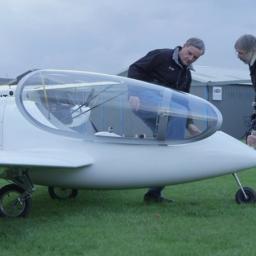Boeing developing experimental hybrid-electric aircraft
 Researchers from the University of Cambridge, in association with Boeing, tested the first aircraft to be powered by a parallel hybrid-electric propulsion system, where an electric motor and petrol engine work together to drive the propeller. The demonstrator aircraft uses up to 30 per cent less fuel than a comparable plane with a petrol-only engine. The aircraft is also able to recharge its batteries in flight.
Researchers from the University of Cambridge, in association with Boeing, tested the first aircraft to be powered by a parallel hybrid-electric propulsion system, where an electric motor and petrol engine work together to drive the propeller. The demonstrator aircraft uses up to 30 per cent less fuel than a comparable plane with a petrol-only engine. The aircraft is also able to recharge its batteries in flight.Though increasingly common in the automotive industry, the technology has never before been brought to the aerospace sector. During take-off and climb, when maximum power is required, the engine and motor work together to power the plane, but once cruising height is reached, the electric motor can be switched into generator mode to recharge the batteries or used in motor assist mode to minimise fuel consumption. The same principle at work in a hybrid car.
I just looked up the specific energy densities for LiPo and Jet A-1. They are 0.56 vs 43 MJ/kg. There is something like a 80 times difference. Let's say that you replace 100kg of fuel with equivalent batteries. The batteries will weigh 8 tons. This will make you burn 800 kg more fuel than normal, for a short 3 hour flight. I fly 320s and I simply doubled the numbers for A320 to get at 787. It is probably incorrect, but I'm sure it's in the ballpark. For a long flight like 10 hours, you burn 2500 kg more fuel just to carry the dead batteries.
I didn't mention a couple of things here: with regular fuel, consumption per hour reduces as the flight progresses and the aircraft becomes lighter. Also, for big electric motors, you will have another weight penalty, probably measured in tons. Electric motors are more efficient than turbofans, but I don't see how that could offset the costs I have mentioned because turbofan engines are also quite efficient, something like 70% IIRC.
In order to SAVE fuel using batteries, something drastic needs to be done, such as shutting down
engines during cruize or something similarly extraordinary. You could maybe do that with smaller aircraft, but never with a big aircraft like 787.